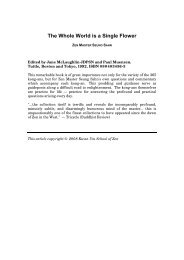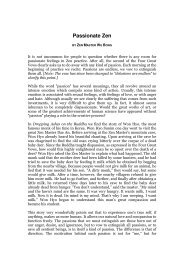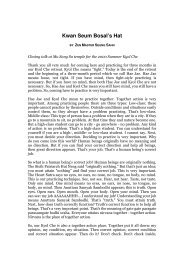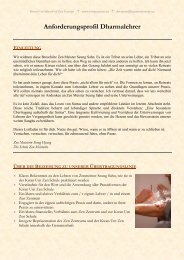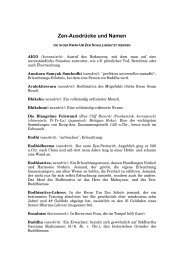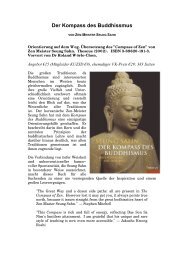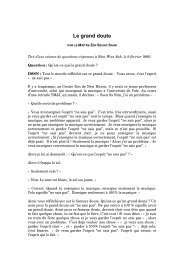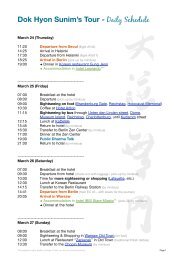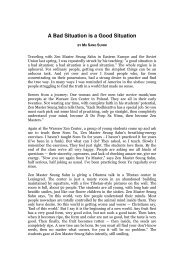Samadhi and Zen - Kwan Um School of Zen Europe
Samadhi and Zen - Kwan Um School of Zen Europe
Samadhi and Zen - Kwan Um School of Zen Europe
Create successful ePaper yourself
Turn your PDF publications into a flip-book with our unique Google optimized e-Paper software.
<strong>Samadhi</strong> <strong>and</strong> <strong>Zen</strong> – <strong>Zen</strong> Master Seung Sahn’sTeaching in <strong>Europe</strong>BY MU SANG SUNIM<strong>Zen</strong> Master Seung Sahn is like a w<strong>and</strong>ering mechanic — everywhere he goeshe finds some engine, so to speak, which needs its valves adjusted, its screwstightened, old oil removed <strong>and</strong> fresh oil put in. On our recent teaching trip towestern <strong>Europe</strong> he found that many people were confused about the relationbetween "samadhi" <strong>and</strong> <strong>Zen</strong> practice. So he taught over <strong>and</strong> over that whilesamadhi — "one-mind," "not moving mind" may appear "on the way," it is notthe goal <strong>of</strong> <strong>Zen</strong>. The aim <strong>of</strong> our practice is truth or "clear mind," <strong>and</strong> thecorrect functioning <strong>of</strong> truth moment to moment.<strong>Zen</strong> Master Seung Sahn at the Oslo Fjord, Norway. Behind him is a traditionalgrass-ro<strong>of</strong>ed house."It is possible," <strong>Zen</strong> Master Seung Sahn taught, "for people with a lot <strong>of</strong>thinking to use samadhi to cut <strong>of</strong>f their thinking, cut <strong>of</strong>f their desire, <strong>and</strong> get alot <strong>of</strong> energy. The universe <strong>and</strong> you become one point. But enlightenment doesnot depend on energy. In enlightenment there is no concern with energy."Enlightenment <strong>and</strong> non-enlightenment are the same point. A long time ago, a<strong>Zen</strong> Master said, 'Before I got enlightenment, when I saw the sky, blue; after Igot enlightenment, when I see the sky, also blue.' That's enlightenment — thesame point — the sky is blue. Getting enlightenment or not gettingenlightenment doesn't matter."<strong>Samadhi</strong> has no cause, no effect, no karma, no enlightenment, no I, nothingat all — only energy. No sky, no color. But it's very easy to attach to samadhienergy <strong>and</strong> lose one's way. 'I am wonderful, I have lots <strong>of</strong> energy, I can doanything!' — this kind <strong>of</strong> mind can appear: much desire, much attachment topower. Then you return — BOOM! — to small I. I-my-me again appears. Sothis is very dangerous."A second major theme addressed the students' concern about the relationshipbetween teacher <strong>and</strong> student. <strong>Zen</strong> Master Seung Sahn stressed that "<strong>Zen</strong>means not depending on God, or Buddha, or a teacher, or religion, butcompletely becoming independent. You must believe in your true self 100%. Ifyou cannot believe in your true self, then you must believe in your teacher100%. If you have no teacher, then you must believe in Buddha 100% — onlykeeping your own opinion is no good."Believing in your teacher <strong>and</strong> depending on your teacher are different. If youbelieve in your teacher, there is no subject, no object, no inside, no outside —inside <strong>and</strong> outside become one. Then you can believe in your true self, also
you can believe any teacher, also you can believe your eyes, ears, nose, tongue,body <strong>and</strong> mind. But if you only depend on your teacher, that is making two, Iam here, something is there. That is not correct. When we are children, wedepend on our parents. Then if our parents go away, we cry, cry, cry. But afterwe grow up we no longer depend on our parents; we can take care <strong>of</strong>ourselves. So don't be like a child — you must become independent. And don'tdepend on your teacher, only believe in your teacher 100%."After one <strong>of</strong> the retreats in <strong>Europe</strong>, <strong>Zen</strong> Master Seung Sahn told two storiesthat further illuminate the dangers <strong>of</strong> attaching to samadhi:"A long time ago in China, during the time <strong>of</strong> <strong>Zen</strong> Master Lin Chi, there was amonk who was very famous for his samadhi practicing. 'This monk never woreany clothes <strong>and</strong> was known as the "naked monk." He had mastered manykinds <strong>of</strong> samadhi, had lots <strong>of</strong> energy, <strong>and</strong> didn't need to wear clothes even inwinter."One day Lin Chi decided to test this monk. He called a student <strong>of</strong> his, gavehim a set <strong>of</strong> beautiful clothes, <strong>and</strong> asked him to present them to the monk. Thestudent went to the monk <strong>and</strong> said, 'Ah, you are wonderful. Your practicing isvery strong. So my teacher wants to give you these beautiful clothes as apresent.' The monk kicked away the clothes <strong>and</strong> said, 'I don't need theseclothes. I have original clothes, from my parents! Your clothes can only bekept a short time, then they will wear out. But my original clothes are neverbroken. Also, if they become dirty, I just take a shower <strong>and</strong> they are cleanagain. I don't need your clothes!'"The student went to Lin Chi <strong>and</strong> told him what happened. Lin Chi said, 'Youmust go to this monk once more <strong>and</strong> ask him a certain question.' So thestudent went to the monk <strong>and</strong> said, 'Great monk! I have one question for you.You said you got your original clothes from your parents.' 'Of course!' said themonk. 'Then I ask you, before you got these original clothes from yourparents, what kind <strong>of</strong> clothes did you have?' Upon hearing this, the nakedmonk went deep into samadhi, then into nirvana (he died)."Everyone was very surprised <strong>and</strong> sad. But when the monk's body wascremated, many sarira appeared, so everyone thought, 'Ah, this was a greatmonk.' Sitting on the high rostrum, Lin Chi hit the st<strong>and</strong> with his <strong>Zen</strong> stick<strong>and</strong> said, 'Form is emptiness, emptiness is form.' He hit it again, 'No form, noemptiness.' He hit it a third time, 'Form is form, emptiness is emptiness.Which one is correct?' Nobody understood. Then the <strong>Zen</strong> Master shouted'KATZ!' <strong>and</strong> said, 'The sky is blue, the tree is green.' If you cannot answer inone word the question about your original clothes, then, although you can getsamadhi <strong>and</strong> nirvana, you cannot get freedom from life <strong>and</strong> death."Then the <strong>Zen</strong> Master stared at the sarira — po<strong>of</strong>! — they turned to water. Thisis magic! They all turned to water <strong>and</strong> disappeared. Everyone was surprised.The meaning <strong>of</strong> this is: if you do samadhi practice deeply, then when you diemany sarira will appear. But, these sarira will not last long because theyrepresent ,one mind,' not 'clear mind' which is our original nature. Ouroriginal nature has no life, no death, no coming or going. When the true
dharma appears, which means form is form, emptiness is emptiness or sky isblue, tree is green- that energy -BOOM! - will appear, all the sarira will turn towater <strong>and</strong> disappear. Our teaching is substance, truth, <strong>and</strong> correct life. Our<strong>Zen</strong> practicing means attain your true self, find the correct way, truth, <strong>and</strong> life.Any style <strong>of</strong> practice is OK — even using a mantra. But, don't be attached tosamadhi — you must 'pass' samadhi. <strong>Zen</strong> means 'everyday mind,' not specialstates <strong>of</strong> mind. Moment to moment keeping a clear mind is what's important."Here is another example. Once one <strong>of</strong> my students decided to practice withan Indian guru. This guru taught samadhi practice. So my student got amantra, tried it all the time when he wasn't working, <strong>and</strong> went deeply intosamadhi. All the time he was having a very good feeling. Then one day whiledoing this mantra, he was crossing the street. The next thing he knew, a carscreeched to a halt, almost hitting him, <strong>and</strong> loudly sounded its horn. Thedriver shouted at him, 'Keep clear mind!' Then my student was very afraid.The next day he came to me <strong>and</strong> said, 'Dae Soen Sa Nim, I have a problem.Last night I almost died. I was practicing samadhi, didn't pay attention <strong>and</strong>was almost hit by a car. Please teach me my mistake.'"So I explained to him, samadhi practicing takes away your consciousness. But<strong>Zen</strong> means moment to moment keeping clear mind. What are you doing now?When you are doing something, just do it. Then this kind <strong>of</strong> accident cannothappen. So don't make samadhi. Don't make anything! Just do it, O.K.?"Mu Sang Sunim is director <strong>of</strong> Dharma <strong>Zen</strong> Center in Los Angeles.This article copyright © 2008 <strong>Kwan</strong> <strong>Um</strong> <strong>School</strong> <strong>of</strong> <strong>Zen</strong>




